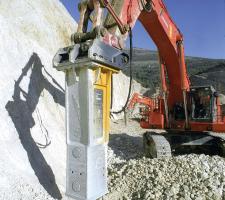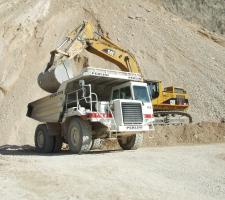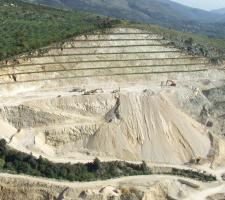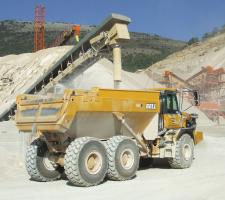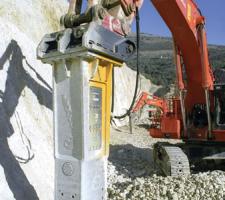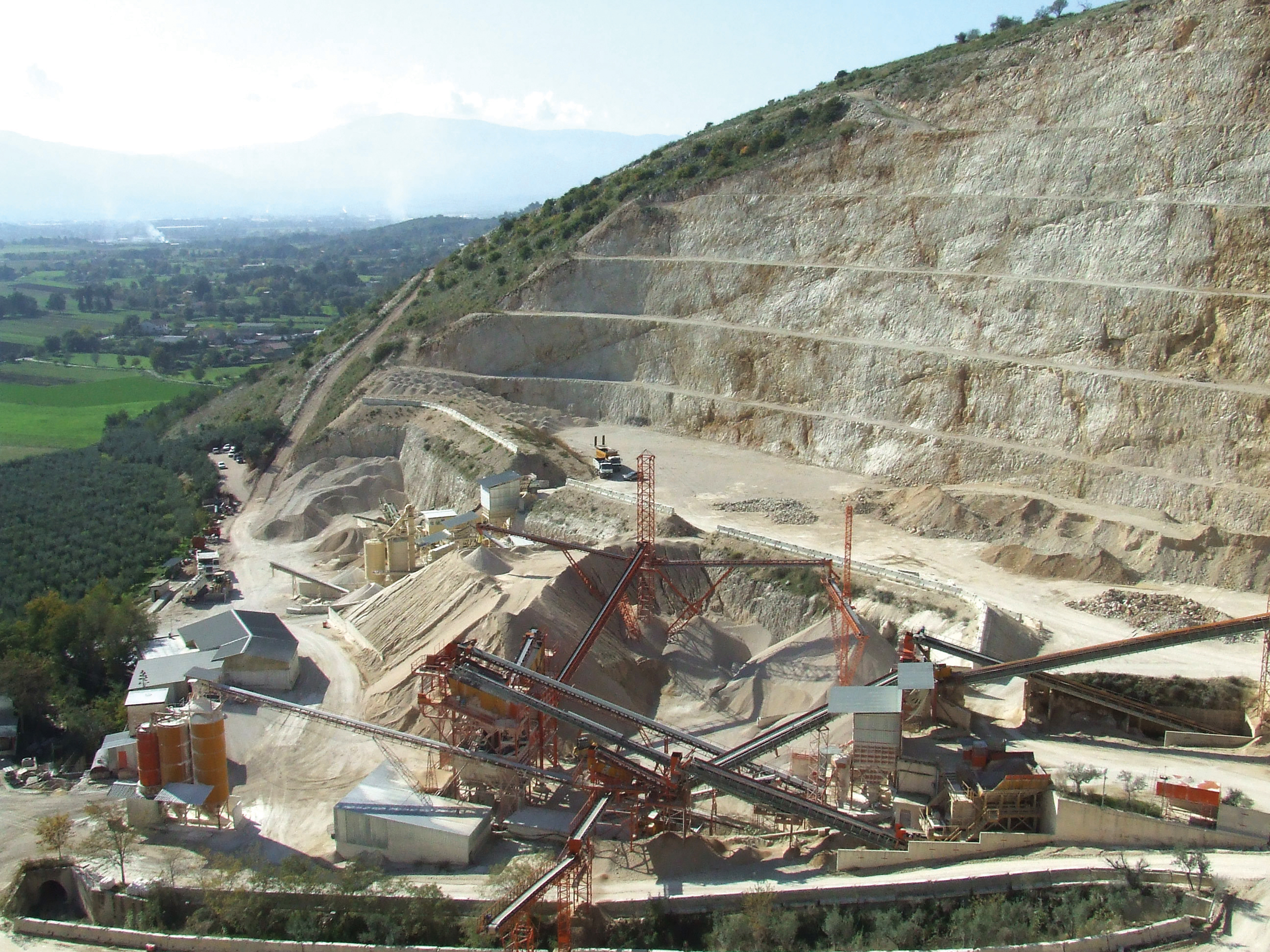
With celebrations planned for the company's centenary, the Marocca Group's Alberto Marocca talks to Claire Symes about plans for the Anagni Quarry's next 100 years.
Italy's aggregates business is well known for its family-owned business with produce around 70% of the country's quarried material. But Anagni, 50km east of Rome, is home to one thriving privately-owned quarrying business - the Marocca Group.
At the heart of the €14million a year turnover operation is the Anagni limestone quarry, which produces around 500m3 of material an hour. Keeping pace with this production has led to significant investment in equipment - most recently the first of the 11tonne
History
The Marocca Group was founded 100 years ago and has been operating Anagni Quarry since 1954. It is now the company's only quarry but it previously operated at other sites in the region but Anangi has reserves to see the company through its next 100 years, even with its production rate of 5000m3 per day.
Today the business is run by group president Alberto Marocca and the quarry's 30-strong workforce also includes including three members of the Morocca family - Marocca's daughter has recently joined the business and his two nieces also work on administration.
The 43ha quarry exploits a very pure limestone deposit with 99% purity and 88% brightness that makes it much sought after. "Comparing the material on the Los Angeles scale of hardness, it is equivalent of basalt," said Marocca.
This quality means that the material is delivered to a wide area, right across central Italy from Florence to Naples for use in plaster, cement, public works and road construction. The company operates a fleet of trucks to deliver material to customers, but customers also collect aggregates directly from the quarry.
The Marocca Group also has an asphalt plant near to Anagni that can produce up to 220tonnes per hour and the business also has a road construction division.
The quarry produces 21 different grades of aggregates. "We have worked hard to develop our grades to make the best use of the reserves and produce high quality materials," explained Marocca.
Although there are significant reserves at the site, restoration in exhausted parts of the quarry is already underway with the completed benches being coated with topsoil and planted with trees.
Extraction
The rock is extracted by drill and blast - the quarry uses an Atlas Copco ROC F7 rig to drill the 105mm diameter blast holes to a depth of 4 to 10m with a 2 to 2.5m spacing but uses a contractor to carry out the actual blast. Use of contractors for this element of the work reduces the security issues for the company.
"We have always used blasting and never had a problem - we don't have any close neighbours to the site so noise is not really an issue but we do try to keep levels as low as possible," said Marocca. "We use microdelays for the dynamite blast to ensure we get a good break and minimal noise." Blasts are carried out every two to three days, extracting 8000tonnes each time, and produce benches measuring 8m in height and depth.
The hydraulic breakers are used for secondary breaking and to clean up the benches, which Marocca said makes the site much safer. He said that the acquisition of the HP 18000 has helped to speed up this work and has helped make full use of the 120tonne
"We have worked hard to develop our grades to make the best use of the reserves and produce high quality materials" Alberto Marocca, president, Marocca Group
"Ripping can only be used with rock up to a certain strength and leaving that material creates an uneven bench, so use of the breaker means that the profile of the bench can be quickly smoothed. We already had the excavator so adding the breaker to the attachments has improved its work," said Marocca. "The quick coupler means that the excavator operator can switch between attachments very quickly."
The quarry also uses an HP 12000, HP 7000 and an HP 2500. Marocca said that the HP 12000 was good but the new HP 18000 is much more effective.
Blasted material is loaded into trucks - a mix of rigid
The crushing and screening plant can operate 24 hours a day and the trucks deliver material into a surge pile to allow this scale of operation. However, due to a decline in demand, the plant is currently working a single 10 hour shift.
According to Marocca, electricity prices can be significantly cheaper overnight - around 70 to 80% less than during the day - making it more economical to operate 24 hours a day.
Excavators
1x Hitachi 1200-SD
1x Hitachi 670 LCH-3
1x Hitachi ZX 210 LCN-3
1x Cat 365B
1x Cat 345C
1x Cat 330C
1x Cat 317B
1x Yanmar B17
Wheeled Loaders
1x Cat 980G
2x Cat 966G
1x Cat 428C
Tracked Loaders
1x Cat 973CB
1x Cat 955L
Dozer
1x Cat D9H
Rigid Dump Trucks
1x Perlini DP405
1x Perlini DP205
1x Perlini T15
Articulated Dump Trucks
1x Bell B25D
Fixed Crushers
1x MEM 1150
2x MEM R5
1x Hazemag AP-PH1214
1x L&P CR 61
1x Morandotti P4
Mobile Crushers
1x REV GRC 98
The crushing plant is supplemented by a mobile Rev crusher and screen to add extra capacity.
Marocca places a great deal of emphasis on maintenance of machines and improving the skills of his operators as he said this adds to the reliability. The company has its own workshops to ensure machines are kept in good condition.
Environmental considerations are also high on Marocca's agenda - he is in the process of investing in seven water cannons from WLP which will be positioned around the site to control the dust.
Marocca also prides himself on the safety of his quarry and this is evident in the good housekeeping throughout the quarry, particularly that delivered by the breakers used to clean up the benches after blasting. "It costs around €500,000 a year to operate the breakers but it is worth it," he said.
Marocca has also spent time and money in ensuring the crushing and screening equipment - as well as the employees working that area - are protected from potential rocks falls from the quarry faces above.
Investment
Within the next year, Marocca plans to add another mobile crushing plant and this will mark a significant change in the way the quarry operates.
The quarry's current benching produces a 45 degree angle but new legislation means that this needs to be reduced to 30degrees.
The new plant will be positioned at the top of the quarry and extraction will be from the top down working in horizontal phases to produce shallower benches in the final profile. The new bench height will be just two metres and the depth 4m to give the new angle.
The new crusher - likely to be a 1500tonne Metso Minerals unit - will carry out the primary crushing at the new face and the material will then be delivered to the existing stationary plant by a series of mobile conveyors and tunnels. According to Marocca, the Metso machine does not offer the chamber size that he would like for the new operation and the higher cost than other machines on the market is a significant issue but he believes that the level of investment is needed to ensure the quality of his aggregates.
"Moving the crushing up to the top of the quarry is a very complicated project in terms of logistics - once we have got the crusher and excavator up there, we also need to be able to get the fuel to it. But once in place, it could deliver 500m3 per hour and around 6000 to 7000m3 per day," he said.
"This will be a 70 to 100 year project and will take the quarry to completion," said Marocca. "The investment is around €4 to 6million and will simplify the extraction as it will need just three people and will also be much safer."
The investment is likely to include a new 200tonne machine and Marocca said that he recently travelled to Japan to see Hitachi's 200tonne machine in action. "Investing in larger equipment could give up to 700m3 per hour capacity," he said.
Passion
Marocca has worked at the quarry for 40 years but is actually qualified as an architect and also had an active political career but says that quarrying is in his DNA. He is confident that the business will remain a family one when he is ready to retire - as well as his daughter and nieces, he has a son who is still at school. "There are plenty of heirs," he said, but it is clear that he has no intentions of retiring for a long time.
"I am up at 5am and here sometimes until 9pm - I am married to this quarry."
He said that if you were not passionate about the rock and the quality of the aggregates you would not continue to operate under the difficult regulations imposed on Italian quarries. "It is challenging to operate with the legislation but it keeps me focused," he said. "We are lucky in that we own all of the land we extract from and do not need to go to the bank for finance to expand and improve the operation."
Confidence
Despite this good financial fortune, the quarry has suffered in the recession and Marocca said that turnover is 20% down this year but is confident that demand will return.
In addition to the planned investment next year, Marocca said that he has retained his workforce throughout the downturn despite the lower demand for aggregates. "They are skilled workers and losing them could have big impact on the business in the long term," he said. "Take my
It is clear that Marocca's focus on quality and investment will ensure that the group's next 100 years are likely to be as prosperous as it's first.


